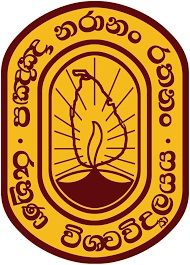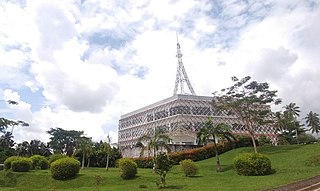
"The Open University of Sri Lanka" (OUSL) is a national university in Sri Lanka. It is unique within the Sri Lankan national university system for being the only university to offer programs of study leading to Certificate, Diploma, Degrees and Postgraduate degrees up to PhD level through the Open and Distance Mode of Learning(ODL). The degrees awarded by the university are treated as equivalent to degrees awarded by any other Sri Lankan University under the preview of the University Grants Commission.

The Sri Lanka Institute of Information Technology is a non-profit private universityin Sri Lanka specialising in technology and management. It has two campuses and four regional centres, the main campus being based in Malabe and a Metropolitan Campus in Colombo. SLIIT is a member of the Association of Commonwealth Universities and International Association of Universities, and has several partnerships with international universities.

Education in Sri Lanka has a long history that dates back two millennia. While the Constitution of Sri Lanka does not provide free education as a fundamental right, the constitution mentions that 'the complete eradication of illiteracy and the assurance to all persons of the right to universal and equal access to education at all levels" in its section on directive principles of state policy at (27. Sri Lanka's population had an adult literacy rate of 96.3% in 2015, which is above average by world and regional standards. Computer literacy in 2017 28.3% and phone users in 2017 105%, website users 32% in 2017. Education plays a major part in the life and culture of the country, which dates back to 543 BC. Sri Lanka's modern educational system modeled after Christian missionary system was brought about by its integration into the British Empire in the 19th century. Education currently falls under the control of both the Central Government and the Provincial Councils, with some responsibilities lying with the Central Government and the Provincial Council having autonomy for others. Education institutions with a tradition dating back to 5 BC are largely ignored by the state.

The University of Ruhuna is a public university in Matara, Sri Lanka.

Lalith William Samarasekera Athulathmudali, PC, known as Lalith Athulathmudali, was a Sri Lankan statesman. He was a prominent member of the United National Party, who served as Minister of Trade and Shipping; Minister National Security and Deputy Minister of Defence; Minister of Agriculture, Food and Cooperatives and finally Minister of Education. Following a failed impeachment of President Ranasinghe Premadasa, he was removed from the UNP and formed his own party, the Democratic United National Front. He was assassinated under mysterious circumstances in 1993.
Overseas Sri Lankan Muslim Educational Trust or OSMET is an educational charity inaugurated in 1981 to provide higher education scholarships to under-privileged Sri Lankan Muslims in the fields of science, IT, engineering and medicine. To date OSMET has been able to assist over 600 students in one form or another. Their goal is to become one of the premier scholarship funds in Sri Lanka.

Deshamanya Nissanka Parakrama Wijeyeratne, known as Nissanka Wijeyeratne, was a Sri Lankan politician, civil servant, diplomat and English language poet. He was also the Diyawadana Nilame of the Sri Dalada Maligawa, Kandy from 1975 to 1985. At the time of death he was serving as the chairman of The Law and Society Trust in Sri Lanka.

Ravindra Sandresh Karunanayake is a Sri Lankan politician. A former Member of Parliament for the Colombo District, he served as the Minister of Foreign Affairs from May 2017 to August 2017, Minister of Finance from 2015 to 2017, and Cabinet Minister of Commerce and Consumer Affairs from 2001 to 2004 and Cabinet Minister of Power and Energy since December 2018 till November 2019.
Keheliya Rambukwella is a Sri Lankan politician. He is the former Minister of Mass Media and Information and the current Minister of Health.

Wilmot Abraham Perera (1905–1973) was a Sri Lankan statesman and philanthropist. He was declared a National Hero in 1993. A member of parliament, he was Ceylon's first Ambassador to China.

Royal College is a selective entry boys' school located in Colombo, Sri Lanka. Started as a private school by Rev Joseph Marsh in 1835, it was established as the Colombo Academy by Sir Robert Wilmot-Horton in January 1836, as part of the implementation of the recommendations of the Colebrooke Cameron Commission (1833), and was the first government-run secondary school for boys in the island.

Lalith Athulathmudali, the former Cabinet Minister of Trade, National Security, Agriculture, Education and Deputy Minister of Defence of Sri Lanka was killed at 8:10 p.m. Sri Lanka Time on 23 April 1993 in Kirulapana. Athulathmudali was fatally shot while addressing a gathering, approximately 4 weeks ahead of the Provincial Council elections for the Western Province, May 1993.
Higher education in Sri Lanka is an optional final stage of formal learning following secondary education. Higher education, also referred to as tertiary education occurs most commonly universities or degree-granting institutions. These may be public universities, public and private degree-granting institutions which award their own degrees or degrees from foreign universities. High visibility issues include limited capacity of public universities to cater for the demand and opposition to private universities from certain segments.

President's College - Minuwangoda was founded on 9 February 1979 in Minuwangoda.
The Committee On Public Enterprises (COPE) is a parliamentary committee established on July 21, 1979 by the Parliament of Sri Lanka.
The United Board for Christian Higher Education in Asia is an organization founded in 1922 that supports whole person education in colleges and universities in Asia. The Board is a 501(c)(3) organization incorporated in the State of New York, and is also a registered charity in Hong Kong. It collaborates with higher education institutions in 15 countries and regions of Asia, both conducting program, and making grants. It began its work China.
Samarajeewa "Sam" Karunaratne, FIET, FIEE, FIESL is an emeritus professor of engineering and a leading Sri Lankan academic who is the founding chancellor and president of the Sri Lanka Institute of Information Technology and the former vice-chancellor of the University of Moratuwa. He has held a number of other appointments in the field of higher education in Sri Lanka, including senior professor of electrical engineering and dean of the Faculty of Engineering and Architecture, president of the Institution of Engineers, Sri Lanka. Karunaratne is a pioneer in the development of the use of computers in the field of engineering and played an important role in the development of information technology education and industry in Sri Lanka.
The Employees' Trust Fund (ETF), a social security programme, was established on 1 March 1981 under the Act No.46 of 1980 by the Parliament of the Democratic Socialist Republic of Sri Lanka to promote (i).employee ownership, employee welfare and economic democracy through participation in financing and investment (ii).employee participation in management through the acquisition of equity interest in enterprises and to provide for non-contributory benefits to employees upon retirement. All workers i.e. Permanent, Temporary, Casual, Contract, Piece-rate wages, Learners and apprentices who are employed in private and public sector are eligible to be benefited by it.

The Sri Lanka Institute of Nanotechnology is a Sri Lankan research institute specialising in the field of nanotechnology. It was incorporated in 2008 as a public-private partnership between the Government of Sri Lanka and five private companies, and is notable for being the first public-private research institute in the country.

Vishtasp Kairshasp Choksy is a Sri Lankan Lawyer and advisor. He is a Civil Lawyer and appointed President's Counsel. Choksy belongs to an influential family and is the son of politician and lawyer K. N. Choksy P.C. His expertise in resolving legal disputes and issues for government organisations as well as private clients are remarkable. Choksy was one of the active members and contributed the best of his knowledge in the constitutional challenge to the dissolution of Parliament in 2018.













